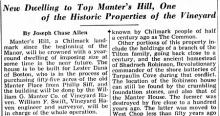A plan to build a private golf club on land owned by the MacKenty family in Edgartown will get its first public airing this week when the Edgartown zoning board of appeals opens a hearing on an application for a special permit associated with the proposed development.
The MacKentys have signed an agreement to sell some 200 acres of their Edgartown Great Pond land to Rosario and Barry Latucca, a father and son team from Natick. The Latuccas hope to build an 18-hole golf club on the property.
The hearing is set for Wednesday at 7:30 p.m. in the basement of the Old Whaling Church in Edgartown. Technically, the application is for a special permit for a private, nonprofit club, a conditionally permitted use under the Edgartown zoning bylaws.
The hearing is expected to be well attended; the zoning board of appeals has notified all town land use boards and a variety of other agencies about the meeting, as well as some 47 abutters.
Mr. Latucca said he plans to bring a preliminary routing plan to the hearing, along with a number of environmental consultants who have been hired to assist with the golf course development.
“We know the environment is going to be our biggest topic, so we are going to try and answer as many questions as we can,” said Mr. Latucca, who said the plans for the MacKenty land are still in the early stages.
The MacKenty land is owned by John MacKenty, Jeremiah MacKenty and Katherine Bigelow. The Latuccas have an agreement to buy the land, pending the acquisition of the necessary permits.
The Latuccas are not the only group vying to build a golf course on the Island. A separate group is involved in plans to create a golf course development at the Old Vineyard Acres II subdivision off the West Tisbury Road, not far from the MacKenty land. In Oak Bluffs, an aggressive Connecticut development group wants to build a private golf course on the site of Webb’s Camping Area.
Two leading conservation groups have now taken an open stand against the proposal for a golf course on the MacKenty property.
On Friday, the Sheriff’s Meadow Foundation voted to adopt a resolution to oppose the Latuccas’ application for a special permit, citing important habitat and the location of the property.
“Any golf course built upon this site would be an invasive recreational land use that would fragment the existing wildlife habitat and would forever change the characteristics of this site abutting the shores of the Edgartown Great Pond,” the resolution declares in part.
The resolution has been sent to the board of appeals.
Sheriff’s Meadow is involved with the golf course developers of the Vineyard Acres II subdivision. The foundation owns four lots in the subdivision and has agreed to sell the lots to the group, which wants to build a golf course on the land.
The Vineyard Conservation Society has also taken an open position against the golf course proposal for the MacKenty land. In a letter to the board of appeals yesterday Eleanor Graves, president of the board of directors for the conservation society, wrote:
“There is no question that allowing this particular land use at this location will generate detrimental ‘ripple effects’ in the neighboring area, effects which are within your power to prevent by unequivocally denying this request for a special permit.”
The conservation society letter and the Sheriff’s Meadow resolution also both appear as letters to the editor in today’s Gazette.
Meanwhile, other groups continue to line up in different ways around the issue of golf course development on the Island.
The Conservation Partnership, a coalition of five leading conservation organizations on the Island, issued a white paper yesterday about golf course site selection and evaluation.
“Unless the land has already been extensively degraded, a golf course results in major changes to the existing landscape,” declares the introduction to the paper.
The position paper outlines nine considerations that the partnership has identified as important for evaluating golf course developments. The paper also emphasizes that the considerations should not be viewed as guidelines. The considerations include:
• Wildlife habitat, because fairways, greens and club buildings can fragment important habitats.
• Aquifer and drinking water, and the need to examine the effect of chemicals and also the effect of withdrawing huge amounts of water from the aquifer.
• Surface waters and the need to examine the effects of chemicals on ponds and streams.
• Neighborhood impacts and the effects on surrounding property values, which can have an impact on taxes, traffic and the demand for paved roads.
• Historical and cultural resources and the effect of golf courses on old roads, trails and ancient ways.
• Agricultural use, and the potential for golf courses to displace active farmland.
There is some confusion about the regulatory procedure surrounding golf course developments. It is unclear whether the proposal for the MacKenty land will be referred to the Martha’s Vineyard Commission for review as a development of regional impact (DRI), although it is expected that the subject will come up for discussion Wednesday night. Mr. Latucca said this week that he is willing to cooperate with any review process which may be required.
Under Edgartown zoning bylaws, the board of appeals may consider whether the proposal is appropriate for the location, whether it will adversely affect the neighborhood and whether the facilities are adequate and appropriate.
For small-scale businesses, the board may also consider issues such as traffic, air and water pollution, erosion, surface drainage and whether the proposal fits with the character of the area.






Comments